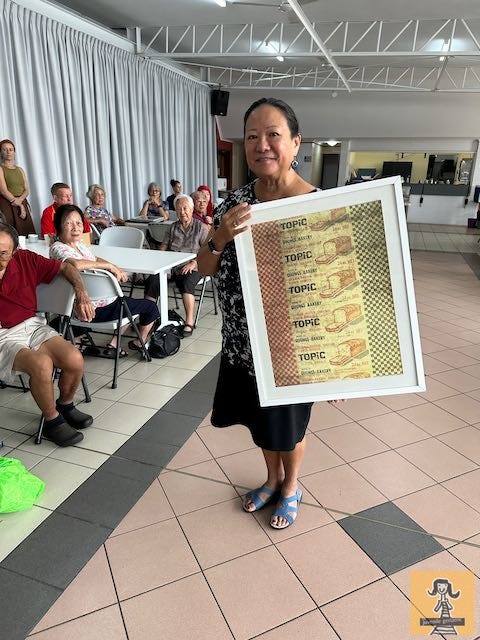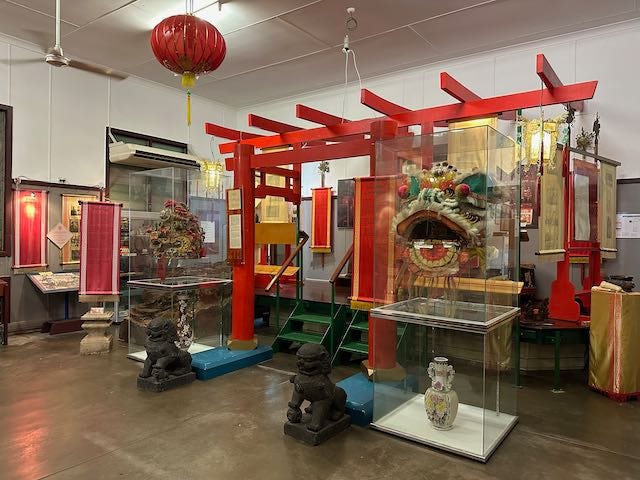Ahead of our first performance of Lost in Shanghai today (Friday), I had the pleasure to deliver a series of family stories workshops in the tropical northern city of Darwin, traditional home of the Larrakia people. Darwin has a diverse population of 140,000 including a substantial transient population. In recent history, this lush city is known for being bombed by the Japanese during the Second World War and for a devastating cyclone, Cyclone Tracy, in 1974.
I recently joined members of the local Chung Wah Society, a Chinese community with a long and proud history in this steamy city. Many members are third and fourth generation Australian Chinese who have lived in the Northern Territory since their ancestors arrived in the late 1800s. Other members arrived here in the 1950’s. And a few are former Australian military personnel who were stationed in Darwin, married local Chinese women and never left.
The family stories workshops I facilitate with the co-operation of my theatre company Contemporary Asian Australian Performance (CAAP), is designed to get people of all storytelling abilities thinking and talking about their family stories. Any beginning can be overwhelming, but if you start with an achievable goal in mind, that first project may quickly sprout siblings, partners and offspring.
In the late 1880’s the Chinese began arriving in the Top End from the Australian goldfields, to work as labourers on the railways or for women, to become wives and partners to the growing number of Chinese men. At the time, the Chinese population outnumbered white Australians by four to one. Darwin once had a thriving Chinatown which survived the Japanese bombing of February 1942 but which was destroyed in the war’s aftermath, ironically, as part of the city’s reconstruction. The loss of Darwin’s Chinatown is still felt by the society’s membership to this day.
It was thrilling to listen to the Chung Wah participants give potted family histories and to see the fabulous heirlooms they’ve collected; photographs, delicate original documents and treasured possessions belonging to their forebears.
Des Fong (below) recounted how his ancestors came to Darwin to work on the construction of the railway. He owns a tael of silver bullion and twisted iron ‘souvenirs’ from his relatives who worked as labourers or ‘coolies’ in the heat and dust.
Barbara Chin’s parents and other stalwarts of the Darwin Chinese community met the Queen who visited Darwin in 1977.
Donna Quong’s father Eddie owned a much-loved bakery in Chinatown. Donna, who worked in the bakery as a youngster, remembers the burns on her arms from putting loaves into the ovens. She spoke of discovering this long-lost piece of wax wrapping. The wax paper she said was considered a modern invention for the bakery in the 1970’s because prior to that, people just got handed their loaves of bread. Quong’s bakery was destroyed during Cyclone Tracy in 1974.
The Chung Wah Society stands in the grounds of a temple in central Darwin. It maintains its own museum built, managed and funded by volunteers. It’s a testament to the community’s resilience and determination that it continues to hold a space in history for these ABCDE’s (Australian Born Chinese from Darwin; English-speaking). I’m happy that we took the first steps to getting some of their storytelling juices flowing during our workshop. I hope the society find the funding and support to realise their dreams of preserving their stories and treasures for future generations.
Before I go, I would love you to see you at the show. If you’d like to support my work, I have a souvenir from this special theatre tour. My friend Elaine G and I collaborated to produce these beautiful cups. I hope you’ll love them as much as we do.









